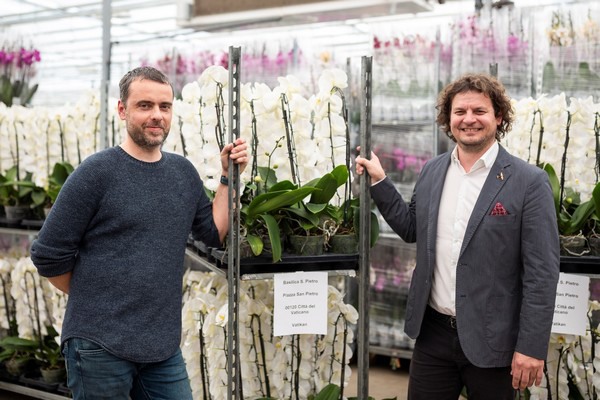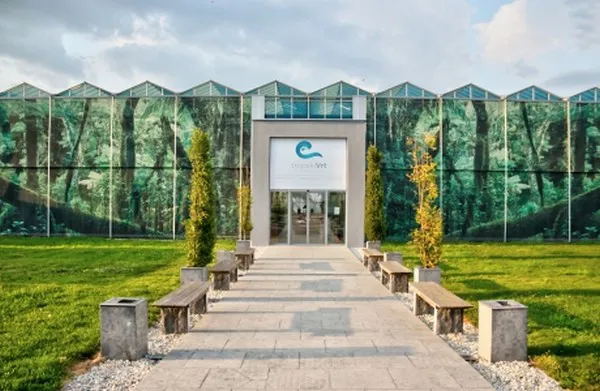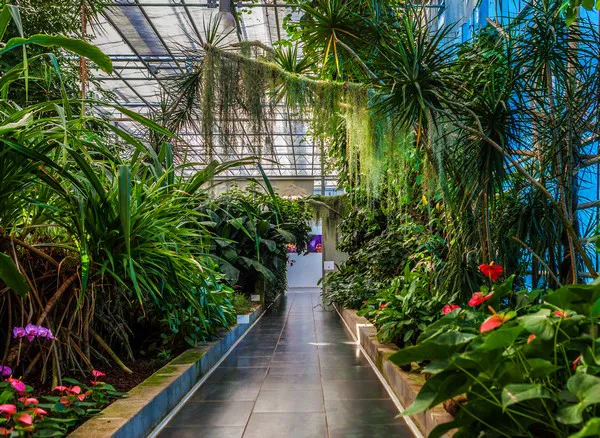“We use geothermal energy as well as solar power to heat our orchid greenhouse. As a result, our carbon footprint is almost zero, “ says Roman Ferenčak, CEO of Ocean Orchids, a Slovenian orchid grower. Ever since he established the company with his business partner Tomaz Jevšnik in 2003, being environmentally conscious has been a big driving force in their decisions. Ferenčak also explains how their close connection with their end consumers gives them insights into the demand according to which they can adjust their production. While the pandemic has been challenging last year, Ocean Orchids is seeing an increasing demand and are focusing on the future where they are aiming to provide their consumers with the exact orchids they are looking for. 
The founders of Ocean Orchids: Tomaz Jevšnik (left) and Roman Ferenčak (right).
“Our CO2 footprint is almost zero”
Being environmentally conscious is one of the most important aspects for Ocean Orchids. Ferenčak explains that by making these decisions, they are not only doing it to reduce their energy costs, having as little of an impact on the environment as possible has been a big driving force since the establishment of their company. “Our orchid greenhouse is heated by a geothermal source. Our location is at the place where several millions of years ago was the Pannonian Ocean. Therefore, we are now able to use this as our geothermal energy source.” In addition, Ocean Orchids added solar panels to their location to produce their own electricity. "As a result our carbon footprint is almost zero, and our company thus produces orchids with the lowest footprint in Europe.”
“Orchid production should be less centralized”
Transportation is another aspect that they are trying to improve. “More than 90% of all orchids are produced in the Netherlands and a lot of them are then transported to foreign countries in trucks, which is of course not environmentally friendly. We are focusing a lot on selling our products locally in order to shorten the transportation lines. At the moment we sell about 25% of our orchids here in Slovenia and the rest to countries in the South East of Europe. I hope that in the future orchid production will be less centralized and that more orchids will be produced around Europe, instead of transporting them.”
Direct line to end consumer
Ocean Orchids also finds it important to have a close connection with their end consumers, as this enables them to directly see developments in demand. “We have a shop at our location, which we call the “Tropical Garden”, where we sell our orchids. It has actually become a spot that attracts tourists as well, as it is a beautiful location where about 4,000 orchids bloom every day. Because of this direct connection to customers we have noticed that orange orchids are becoming more and more popular. This is just one example of the insight this gives us, and we can then amend our production according to the changes in demand, which is a big benefit for us. Many flower growers do not sell directly to their end consumers and go through export companies, which means that they are not fully aware of what they like. I think this direct line is an important aspect of our company that other flower growers should take into consideration as well.”
The "Tropical Garden".
Flowers replaced by toilet paper
Ferenčak explains that last year was especially challenging for Ocean Orchids, as half of the markets where they sell were closed down due to the pandemic. “In addition we noticed that retail was downsizing their space for ornamentals and replacing it with pasta or toilet paper, which was of course of more immediate importance.” Luckily in 2021, their demand has increased again. “Especially now that it is still difficult for companies to export their flowers into Europe due to transportation challenges, we see an increase in our demand for nearby countries.” Still, Ocean Orchids is producing the right amount for their demand and are not planning to expand their 4 hectares of production at the moment. Instead, they want to focus on consumer information and adjusting their production to the demand, in order to provide consumers with the orchids they are looking for.
For more information:
Ocean Orchids
Roman Ferenčak
[email protected]
www.oceanorchids.si
